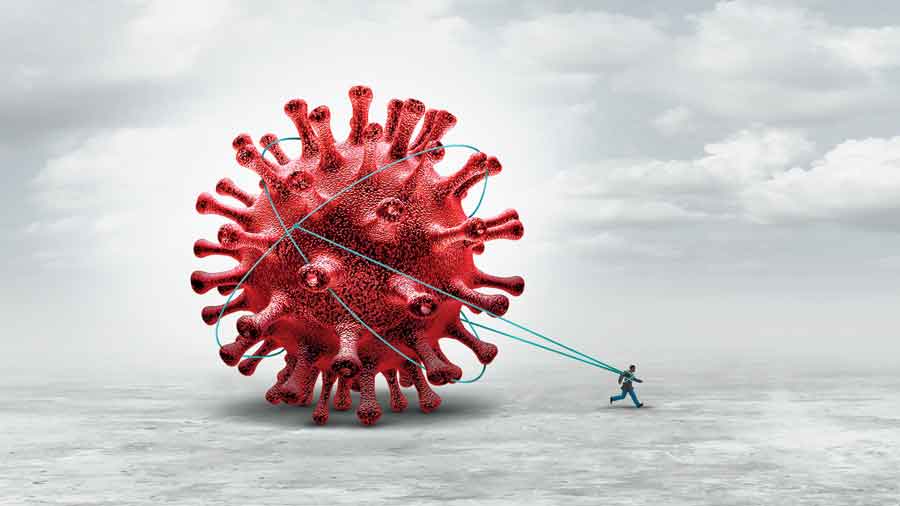In its single-minded pursuit of the “zero Covid” strategy, the Chinese government was omnipresent and omnipotent, using its unlimited resources and unchecked power to control the nation. After having nearly exhausted its resources and the goodwill of the public, the government has now simply disappeared, just as many Chinese are getting very ill with the virus or dying from it.
For much of this year, Yang, an engineer in Shenzhen, took Covid tests nearly every day, from one of the more than 40 government-built booths in his neighbourhood. Whenever he missed one, he would get text reminders from his district. After buying pain relief medication, he got calls from three different community workers because the state had strict rules about the sale of such over-the-counter drugs.
Since the Chinese leadership abruptly abandoned its stringent “zero Covid” policy several weeks ago, Yang has rarely heard from the government.
No one is in charge now,” said Yang, who asked to be identified only by his surname because of safety concerns. His daughter’s school was still open last week even though most students were staying home, either because they were ill or worried about getting sick. There’s no national mask mandate. People with mild symptoms are showing up at work because no one bothers to check in on them anymore. Medicines are in short supply, so Yang is sharing what he has with friends. His family has four rapid test kits, which are being saved until they’re really needed.
For a powerful government that likes to brag about its command of the country and has published a four-volume compilation of speeches and articles by its top leader titled Xi Jinping: The Governance of China, the absence of direction at a moment of crisis has made the public question the legitimacy and the credibility of the Chinese Communist Party.
It also highlights a crucial but not always obvious distinction in leadership.
“The ability to control is different from the ability to govern,” Chen Tianyong, an entrepreneur, wrote on his social media WeChat timeline last week.
Xu Kaizhen, a best-selling author famous for novels that explore the intricate workings of China’s bureaucratic politics, wrote on his verified Weibo account that the abrupt change made it abundantly clear “what our government will do, what it likes to do, what it can do, what it doesn’t like to do, what it can’t do and what it doesn’t want to do”.
If good governance is about transparency, responsibility, accountability and responsiveness to the needs of the people, the Chinese government has barely practised it, either in its harsh “zero Covid” policy, or in its haphazard reopening.`
It could have spent its resources on increasing vaccine coverage among older people and adding ICU beds. Instead, it spent money on mass Covid testing and building enormous quarantine camps.
It could have communicated scientific facts about symptoms and death rates of the omicron variant. Instead, it fanned fears about Covid.
It could have stocked up on fever medicines and provided the public with the best vaccines available. Instead, it made it extremely difficult for people to buy antipyretics and didn’t approve the public use of foreign mRNA vaccines, which have proven more effective than the Chinese ones in preventing severe symptoms.
Unlike many governments that took steps to flatten the infection curve before reopening, the Chinese government suddenly let go of nearly all restrictions, most likely an effort to rush an enormous country to herd immunity while leaving the old and vulnerable in precarious situations.
Its main advice to the public: “You’re in charge of your own health.” The slogan has since earlier this year been promoted and repeated by state media and local governments since the reopening.
But the pandemic is a public health crisis, and such crises are part of the reason governments exist.
The change in pandemic control strategy doesn’t mean the government “can sit on its hands”, Wu Jinglian, a top Chinese economist known for advocating for smaller government, told the Caixin magazine. It “must avoid going from one extreme to the other”.
Qin Liwen, a former journalist, wrote on her WeChat timeline: “Only when a government does what it’s supposed to do, can the people be responsible for themselves.”
The local governments haven’t been doing much either. Many officials are probably waiting for guidance from their superiors. “Zero Covid” could be quantified so everyone knew what to do. In a top-down system like the Communist Party, the underlings are often at a loss for what to do when the big boss doesn’t set a goal.
For weeks, Xi said nothing about the end of the country’s “zero Covid” policy, which was considered his signature campaign. On Monday, in his first public comment on the dismantling of “zero Covid,” Xi was vague, saying that China’s epidemic prevention and control was facing new situations and tasks. He urged the public to “develop good personal hygiene habits” and “practise a civilised and healthy lifestyle”. His remarks didn’t mention either the high infection rates or the death counts.
It would be wise for the officials to wait for his directive. But the public can’t wait.
(New York Times News Service)











